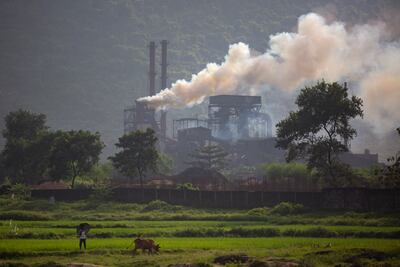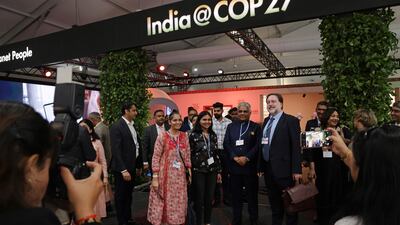India hopes to encourage the world to shift from “mindless and wasteful” consumption to “deliberate utilisation” of natural resources at the UN's annual climate change conference that started in Egypt on Sunday.
Environment Minister Bhupender Yadav will lead the 18-member Indian delegation at the 27th edition of the conference, or Cop27, being held over two weeks in the resort town of Sharm El Sheikh, where he is scheduled to speak on Monday.
The South Asian country is one of the 198 signatories to the UN climate treaty.
With 1.3 billion people, India is the world’s second-most populous country and is vulnerable to the impacts of climate change.
But New Delhi claims it has one of the best strategies to fight climate change and is one of only a handful of developing nations that has been on the track with its climate action commitments.
While Cop27 will focus on mitigation, adaptation, financing and collaboration to fight the climate crisis, India will also promote its concept of Lifestyle for Environment, or LiFE, and invite all countries to join in.
The concept was introduced by Indian Prime Minister Narendra Modi during Cop26 in Glasgow in November last year.
It aims to create and nurture a global network of individuals called “Pro-Planet People” who will adopt and promote environmentally-friendly lifestyles.
“India will emphasise on its invitation to all countries to join the LiFE movement which is a pro-people and pro-planet effort, seeking to shift the world from mindless and wasteful consumption to mindful and deliberate utilisation of natural resources,” the Environment Ministry told The National in an email.
India is one of the major countries under global pressure to check its carbon emissions as it tries to upgrade and expand its infrastructure to meet the needs of its vast population.
But the ministry said India had already achieved its target of switching 40 per cent of cumulative electric installed capacity to non-fossil fuel sources by 2030, one of its Nationally Determined Contributions to fighting climate change.
The NDCs are actions countries pledge to take towards limiting the global temperature rise to less than 2 degrees Celsius.
Presently, 42 per cent of the country's electricity capacity is from non-fossil fuel sources, which is “nine years ahead of the scheduled time”, the ministry said.
India is also likely to push for better financing for developing countries at the summit. India says it needs about $2.5 trillion until 2030 to honour its NDCs.

In August, New Delhi enhanced its commitments to reduce emissions and raised its targets for the use of green energy beyond the levels previously promised.
Instead of aiming for a 33 per cent to 35 per cent reduction in emissions intensity — defined as the amount of greenhouse gas emitted for every unit of GDP — by 2030, India now aims to bring this down by 45 per cent.
It also raised its target for electricity generation from non-fossil fuel resources to half of installed capacity by 2030.
The ministry said the new goals take forward Mr Modi’s vision of sustainable lifestyles and climate justice to protect the poor and vulnerable from the adverse impacts of climate change.
Several experts have welcomed the increase but many have also called it overambitious. The ministry said that the updated NDCs were prepared after “carefully considering national circumstances”.
“It seeks to enhance India’s contributions towards achievement of the strengthening of global response to the threat of climate change … such action will also help India usher in low emissions growth pathways,” the ministry said.


